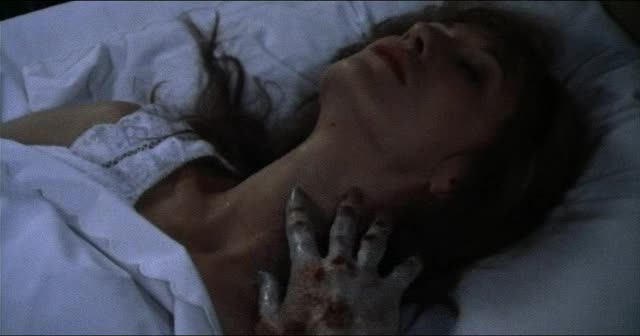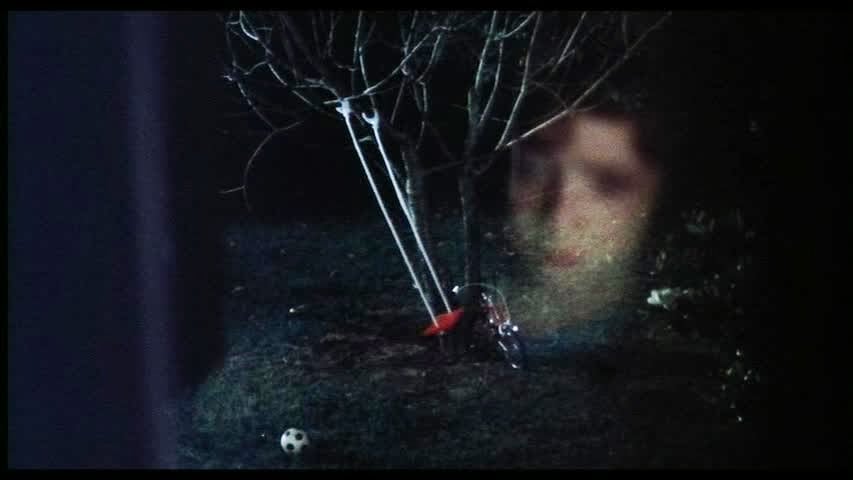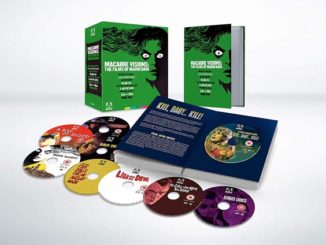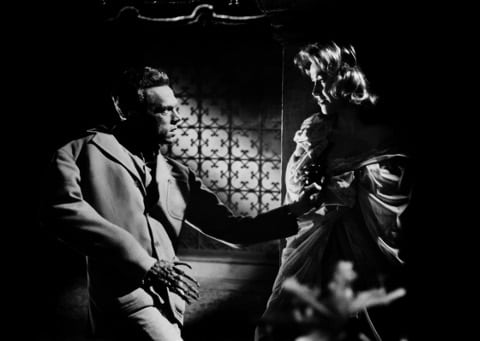Shock (1977)
Directed by: Mario Bava
Written by: Dardano Sacchetti, Francesco Barbieri, Lamberto Bava, Mario Bava, Paolo Brigenti
Starring: Daria Nicolodi, David Colin Jr., Ivan Rassimov, John Steiner
HCF REWIND NO. 207: SHOCK AKA BEYOND THE DOOR 2 [Italy 1977]
AVAILABLE ON DVD
RUNNING TIME: 92 min/ 90 min
REVIEWED BY: Dr Lenera, Official HCF Critic

Dora suffers a nervous breakdown following the mysterious suicide of her husband Carlo, a drug addict who abused her. After a stay in a sanatorium, she is released to the care of her new husband Bruno. Dora, Bruno and her young son Marco settle down in the house she shared with Carlo until a more convenient location can be found, and strange events begin to transpire. Things seem to move and Marco starts behaving very oddly, not just seeming to have unhealthy feelings for his mother but striking up conversations with an imaginary friend….
It’s my belief that Mario Bava, generally considered one of the three kings of Italian horror – the other two being Dario Argento and Lucio Fulci – was possibly the best film-maker of the three, though much of his work was not critically appreciated much in his lifetime. Though I did review four of his movies when this website began, I don’t feel that I did them justice at the time [I like to think I’ve improved as a reviewer since then but I could be wrong!], so I will review one of his films every month or so from now on, as in my opinion he really is one of the great film-makers, and not just of horror. His work is usually stunning to look at, thematically fascinating, rich in black humour, incredibly well made considering the tiny budgets he had to work with, and hugely influential. Perversely, I’ve began with Shock, which was the last film Bava made for the cinema, the only reason being that it was the first one that caught my eye. It’s not actually one of his better films – there is a strong feeling that Bava didn’t put his ‘all’ into the project and that seems to have been true – and much in it doesn’t make much sense either, but it’s still an intriguing, if quite low-key, psychological ghost story that is also, as Bava set out to do every now and again, quite frightening.
Bava actually came out of retirement to make this film. His artistic masterpiece Lisa And The Devil had been released in a re-cut version that all-but-destroyed the original work, and Rabid Dogs was shelved a few days before completion when the studio went bankrupt. It’s understandable that Bava was disheartened with film-making. Shock actually began life in 1971 as an idea about a living house cooked up with Dardano Sacchetti, onto which Bava drafted elements of a true story about marital vengeance. Producer Dino De Laurentiis lost interest in the project but Lamberto later revived it to get his father working again. Mario and Lamberto wrote the script with Francesco Barbieri and Paolo Brigenti. Lamberto has gone on record as saying that Shock is more his own work than that of his father’s, who often walked off the set saying he was ill but possibly ensuring his son got directorial experience [interestingly, Lamberto’s first solo film Macabre is almost like a non-supernatural semi-remake of Shock]. Star Daria Nicolodi, Dario Argento’s ex-girlfriend and star of some of his films, whom Bava specifically requested for the film, loved working with Bava and said that it’s her favourite of all the films she made. She went on to star in Bava’s TV movie The Venus Of Ille. Shock only did middling business at the box office. In the US it was released as Beyond The Door 2, an attempt to cash in the success of The Devil Within Her, which had been re-titled Beyond The Door for American audiences. Two minutes were cut, reducing the role of a psychiatrist, and in the process removing one vital scene, though you wouldn’t know it was missing if you didn’t know about it. These cuts still exists in many cheap DVD versions.
Shock opens with a virtual tour of the house in which most of the story will take place. The camera glides along at floor level going all over the place, and throughout the film Alberto Spagnoli’s camera is constantly prowling around and observing, often from a distance, creating a quietly powerful atmosphere of unease, an atmosphere where innocuous objects adopt a sinister aspect to them even when scary things aren’t occurring. Shock lacks the lush, even beautiful, look typical to Bava’s work, its more muted, realistic approach perhaps showing the input of Lamberto, though it must be said that Mario’s Rabid Dogs also adopted a style very different to Mario’s usual dreamlike, Gothic fashion, so perhaps his style was just evolving in the way Argento’s style became less over-the-top and in-your-face over the years. There’s no doubt though that Shock is a Mario Bava film through and through thematically, it being another of the director’s explorations of the destructive power of family [yet he seems to have had a happy family life] and the cyclical nature of violence, not to mention necrophilia, which he seems to have had a special interest in [and almost made a film about a true-life necrophiliac]. The story is really quite similar to that of The Whip And The Body, where a woman is haunted by her abusive husband, even up to the way it ends, though the approach is maybe more akin to that of Lisa And The Devil in that what is happening on screen is often ambiguous and can be interpreted in more than one way.
It’s actually incest which Shock dangerously skirts close to at times. We spend some time with the family in happy mode, but soon Marco is cutting up his mother’s knickers, spying on her in the shower, pining her down and mimicking sexual thrusting motions, and, in one of the film’s most startling moments, caressing his sleeping mother’s face and neck with a hand that transforms into that of a rotting dead person, presumably Carlo’s. The scene is shot from the point of view of Marco, and therefore it may just be a product of his mind, but then later on the boy does actually appear to be properly possessed, even if he more often just seems to switch places with his father. It’s up to the viewer to decide if the film is just carelessly or randomly written, or whether it’s intended to confuse. I would say it’s the latter – just look at the way Dora’s sightings of Carlo vary, sometimes being of just some invisible thing often waving a visible knife around [a scene which could have looked stupid but is really well achieved considering this was the days before CGI], though some things could have been clarified more. In any case, Shock often feels like a Fulci film with its languid pacing, unexplained deviations and scenes which sometimes go nowhere. One especially interesting and very self-aware scene has Marco do a drawing for the psychiatrist [this was the main scene that is missing from some versions]. The psychiatrist says it’s harmless and means nothing, but we know the drawing has dark implications and actually means quite a lot.
There is probably only one great shock in Shock, but it’s a good one, a superbly executed jump where Marco runs towards Dora and Carlo jumps out at her. Though this film is only mildly gory [a bit of axe violence, some startling severed fingers], there are some moments and devices in Shock that really get under the skin, like when Carlo is seen through the reflection of a glass table, distorting his face, and the whole tale, in whatever sense you take it, is very disturbing. Shock is one of those films where it would be wrong to reveal too much about the story [though I reckon some would guess the twist that occurs two thirds of the way through because it’s been used many times since], so I will be a bit vague here, but, after the hair-raising climactic scenes of what is mostly a very leisurely picture, the coda manages to be sad, even genuinely upsetting, yet also oddly touching at the same time. The surviving character will be traumatised for the rest of their life [and here the film recalls Bava’s A Hatchet For a Honeymoon too], yet their totally different perception of what is real may get him or her through it. I suppose it depends whether you think positively or negatively about such things. Bava had a nihilistic view of life [though not as nihilistic as Fulci’s], but also saw comfort in the unreal, the fantastic, even the frightening. In this respect, he was very much like another of my favourite artists in this area, Edgar Allan Poe, which Shock also seems to occasionally reference such as the old bricked up corpse routine!
While less attractive visually than most of Bava, Shock does have the odd pretty image, like when Dora’s hair floats all over the screen like she’s a more benign Medusa. Daria Nicolodi gives the performance of her life in this film, channelling aspects of her own near-breakdown after the end of her relationship with Argento into what is a very detailed study of insanity [or is it?]. It’s so good that one almost forgets the dubbing, which isn’t too bad in Nicolodi’s case though not so good elsewhere. John Steiner also does well as Bruno: he has a slightly sinister manner to him which adds to the unease. The score by the band The Libra is often very Goblin-like with its catchy prog-rock riffs, though it perhaps works best in its quieter passages, like when a music box tune like a nursery rhyme has distorted synthesiser noises playing beneath it. Shock only possesses a small amount of the elegance and gorgeousness of great Bava, and it can’t help seeming like a compromised work where Lamberto’s influence, whether it extended to directing most of the film or not, was as strong as Mario’s. However, it still has that compulsive feeling of dread that exists in all of Mario’s horror films, and stays lodged in the mind for far longer than most films along similar lines today. This is partly because, I suppose, lots of jump scares and gore may work wonders on first viewing but can’t help but diminish in effect with successive watches, while unsettling moodiness and a really cruel story will always remain as powerful as ever.










Be the first to comment